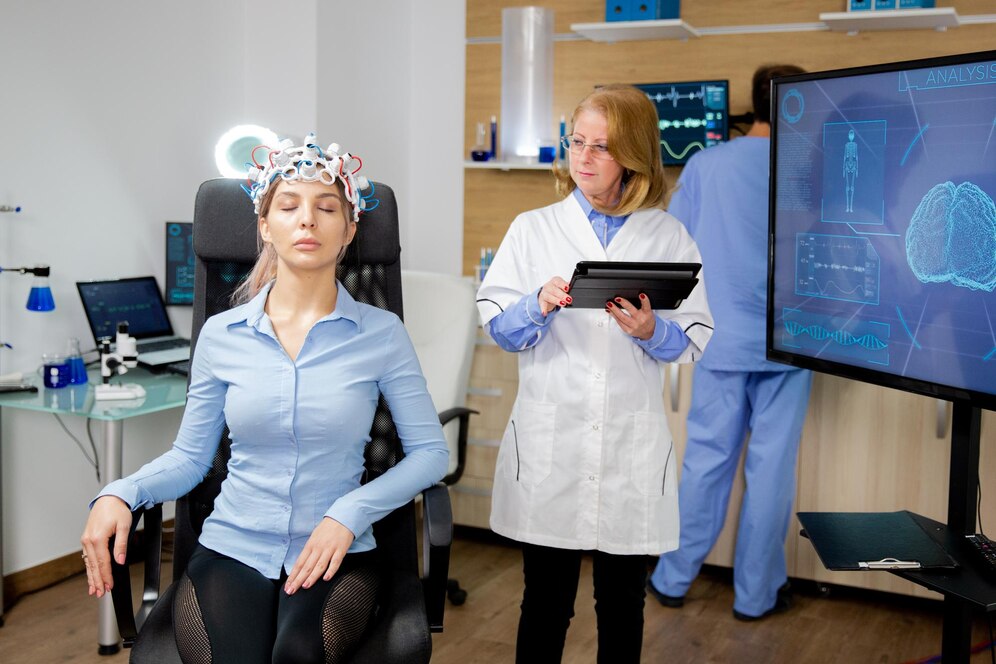Millions of people worldwide suffer from depression, one of the most common mental health disorders. Traditional therapies, such as psychotherapy and antidepressants, are not effective for everyone, even with the abundance of accessible treatments. With minimal progress in their mental well-being, many people are caught in a never-ending cycle of trial and error. This has prompted the search for novel brain modulation techniques for mood disorders that provide longer-lasting, more potent effects. TMS (transcranial magnetic stimulation), a magnetic therapy for mental health, is one such innovation in the treatment of depression.
For those who don’t react to traditional therapies, TMS therapy for major depressive disorder has become a viable substitute. For patients suffering from treatment-resistant depression, repetitive transcranial magnetic stimulation (rTMS) offers a new age of hope due to its non-invasive nature, clinical efficacy, and increasing awareness within the mental health community. This blog will explore the intricacies of TMS therapy and its benefits as a magnetic depression treatment.
What Is TMS (Transcranial Magnetic Stimulation)?
Transcranial magnetic stimulation (TMS) is a non-invasive brain stimulation technique that uses tailored electromagnetic brain stimulation to activate particular brain regions to reduce depression symptoms. In contrast to more conventional treatments like medicine or psychotherapy, TMS does not involve intrusive procedures or systemic side effects. Rather, it uses electromagnetic fields to stimulate the prefrontal cortex, an essential part of the brain for mood control. TMS is one of the best electromagnetic treatments for depression.
The fundamental idea of TMS therapy is that dysregulated neural activity in the brain, especially in regions that regulate mood and cognitive function, is frequently connected to depression. TMS seeks to normalize this activity by applying magnetic pulses via a coil to the scalp, enhancing mood and mental health in general. Repeated TMS sessions can eventually cause permanent alterations in the neuronal circuitry of the brain, which can help stabilize mood and lessen depressive symptoms.
TMS’s increasing popularity is largely due to its FDA approval in 2008 for the treatment of major depressive disorder (MDD). It is now generally accepted as a safe, efficient, and well-tolerated therapeutic option, especially for people who have not responded well to antidepressants or other conventional therapy. TMS is establishing itself as a state-of-the-art substitute for more traditional therapies thanks to its proven effectiveness in clinical trials and growing acceptability in the psychiatric community.
Benefits of TMS Therapy for Depression
There are several benefits of TMS therapy, particularly for those who have experienced treatment-resistant depression. The following are some of the main advantages that make transcranial magnetic stimulation (TMS) an innovative depression treatment with electromagnetic fields:
Drug-Free Solution with Minimal Side Effects
The fact that TMS therapy is a drug-free treatment is among its most important advantages. Weight gain, sexual dysfunction, insomnia, and gastrointestinal problems are among the unintended side effects of antidepressant drugs that many people with depression encounter. People may find it difficult to stick to their treatment plan as a result of these side effects, which could eventually impede their development.
TMS provides a solution that avoids these issues. The adverse effects usually associated with antidepressants are eliminated because TMS transcranial magnetic stimulation (TMS) does not require the use of medicine; it stimulates the brain directly with magnetic pulses. Most patients experience little discomfort when receiving treatment, and any side effects are usually minor and temporary.
Suitable for Patients Who Don’t Respond to Antidepressants
Treatment-resistant depression is one of the main conditions for which TMS therapy is indicated. People who have not responded well to antidepressant drugs or other conventional therapy are referred to by this phrase. Approximately one-third of people with depression do not improve enough with traditional therapies, according to studies. Transcranial magnetic stimulation, or TMS, provides a good substitute for these people.
TMS can result in notable benefits for people with treatment-resistant depression, as clinical trials have repeatedly shown. After completing a series of TMS sessions, some patients report complete remission from their depression symptoms. Because of this, TMS therapy is an essential choice for people who have exhausted all other forms of treatment.
Long-Lasting Improvements in Mood and Mental Health
TMS’s therapeutic benefits are not just instantaneous but also long-lasting. TMS therapy can result in long-term benefits in mood and mental health, in contrast to antidepressant drugs that must be taken consistently to remain effective. Numerous individuals report a notable decrease in depression symptoms after treatment, which may persist for months or even years; however, individual outcomes may differ.
Furthermore, TMS therapy aims to remodel the brain, creating a more robust neural network rather than merely momentarily reducing symptoms. This neuroplasticity—the brain’s capacity to change and rearrange—contributes to TMS therapy’s long-term advantages as a form of neurostimulation for depression.
Proven Results in Clinical Studies
Transcranial magnetic stimulation, or TMS, has been shown in numerous clinical trials to be effective in treating depression. Even in individuals with severe and treatment-resistant depression, TMS therapy has been demonstrated to reduce depressed symptoms significantly. In reality, response rates for patients receiving TMS have been as high as 60–70% in clinical trials.
The growing amount of data demonstrating TMS therapy’s efficacy has contributed to its reputation as a reliable depression treatment choice. Because of this, the medical profession has come to regard it as a conventional treatment for MDD patients who have not responded to previous medications.
What to Expect During a TMS Session
Knowing what a normal treatment session involves is crucial if you’re thinking about using transcranial magnetic stimulation (TMS) as a depression treatment. An outline of what to anticipate during a TMS therapy session is provided below:
Duration and Frequency
Depending on the particular protocol used and the individual’s demands, each TMS session lasts between 20 and 40 minutes. A magnetic coil is positioned close to your scalp, usually on the left side of your head, while you are seated in a cozy chair for the session. The coil sends Rapid magnetic pulses to the specific brain regions.
Most patients receive TMS therapy five days a week for four to six weeks. Depending on your ailment and how well you respond to therapy, your healthcare professional will decide on the precise length of time and frequency of treatment.
Comfort Level During Treatment
Most patients find TMS (transcranial magnetic stimulation) to be a quite comfortable, non-invasive technique. Some people may feel a slight tapping or knocking sensation on their head as the magnetic pulses are administered, although this is usually not uncomfortable. Patients may occasionally have moderate headaches or discomfort in their scalps, but these side effects are usually temporary.
Post-Session Recovery and Minimal Downtime
One of TMS therapy’s most alluring features is its short recovery period. TMS enables patients to return to their regular activities right away after treatment, in contrast to other depression treatments like electroconvulsive therapy (ECT), which may include sedation and protracted recuperation periods. TMS is a convenient and useful choice for people with hectic schedules because most people don’t notice disruptions to their work, social lives, or other activities.
Why Choose Insight Choices for TMS Therapy?
Selecting a provider with the latest equipment, extensive experience, and a solid reputation is crucial when thinking about TMS (transcranial magnetic stimulation) as a depression therapy option. One of the leading providers of TMS therapy is Insight Choices. Here’s the reason:
Experienced Professionals Dedicated to Mental Health
Our staff at Insight Choices consists of experienced mental health specialists who are committed to assisting people in overcoming depression. Because of their specialized training in TMS (transcranial magnetic stimulation), our providers guarantee that every patient receives the best possible care and knowledge.
Advanced Technology and Comfortable Facilities
We use the most recent developments in TMS therapy to provide safe, efficient treatments. Our state-of-the-art technology is developed to minimize discomfort and optimize each session’s effectiveness. Additionally, the well-being of our patients is a priority in the design of our cozy, inviting facilities.
Personalized Treatment Plans for Individual Needs
At Insight Choices, we treat each patient individually because we recognize that they are all different. To achieve the best results, we customize our TMS therapy protocols to each patient’s unique needs.
Conclusion
TMS therapy can be the solution you’ve been looking for if you or a loved one is experiencing depression. With its established effectiveness, minimal side effects, and capacity to produce long-lasting improvements, TMS transcranial magnetic stimulation promises a new hope for patients who have not found relief through traditional treatments.
Insight Choices is dedicated to helping you take charge of your mental health and achieve long-term healing. Our knowledgeable staff is there to help you at every stage of the TMS therapy procedure to guarantee you receive the best care possible.
Take control of your mental health today. Contact Insight Choices to learn more about how TMS therapy can help you find relief from depression.
FAQ’s
- What is Transcranial Magnetic Stimulation (TMS)?
TMS is a non-invasive treatment that uses magnetic pulses to stimulate specific regions of the brain associated with mood regulation. It is commonly used to treat depression, particularly for individuals who have not responded to other treatments.
- Is TMS therapy safe?
Yes, TMS therapy is FDA-approved and has been proven to be safe when administered by trained professionals. Side effects are generally mild and transient, most common being scalp discomfort or mild headaches.
- How effective is TMS for depression?
Clinical studies have shown that TMS transcranial magnetic stimulation is highly effective, with response rates of 60-70% for individuals with treatment-resistant depression. Many patients experience significant improvements in mood and a reduction in depressive symptoms.
- How long do the effects of TMS last?
The effects of TMS therapy can last for months or even years, depending on the individual. Many patients experience sustained mood and mental health improvements following a course of TMS treatments.
- Will my insurance cover TMS therapy?
Insurance coverage for TMS therapy varies by provider and plan. It’s best to check with your insurance company to determine if TMS is covered under your plan.

Dr. Chang is a highly respected psychiatrist with extensive experience serving patients in the greater Los Angeles area. With a distinguished background in psychiatry, he has dedicated his career to advancing mental health care through both clinical practice and academic contributions.

